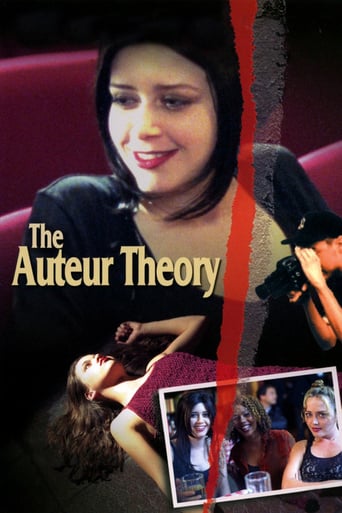tedg
Spoilers herein.I am deep into a study for a book on folding in film. "Folding" is a general term for various types of selfreference, awareness, self-creation and reflection. The very idea behind my study is that this is a very useful thing to understand and use because it makes things more powerful. When exposed as the point of the art -- as in "Adaptation" or any number of similar films -- it serves as a fun playground, for particularly intelligent games.This film puts the lie to that. It doesn't work. It isn't fun. It DOES march through a few of the folding types I have categorized: films about other films, films that make themselves, films about the pretense of folding, films where the game of detecting gets wrapped up in both the story and the story about the story. Judges judging judges.Metadocumentaries.But there isn't a shred of cleverness, not a speck of fun. Even "Final Cut" was better. What could have made this work was better reflection between the two panels of judges and the revelation that the redhead executive was the murderer for reasons having to do with artificially enhancing the folding.When Chris Guest tried this, he knew that the films within the film within the film had to be really good. JJ Leigh worked in "The Big Picture."Ted's Evaluation -- 1 of 4: You can find something better to do with this part of your life
wodehousefan
Well, I certainly had a good laugh -- actually, many good laughs -- while watching this film. Quite clever stuff, and a delightful savaging of the pretensions of student and "indie" filmmakers.Especially enjoyed the exploits of The Unknown Filmmaker -- perhaps, following in the footsteps of the protagonist here (the delightfully-named George Sand) I'll do my own documentary, "In Search of The Unknown Filmmaker"!A rousing cheer for this film, what what!
PeachHamBeach
The Auteur Theory tries hard to be a quietly clever comedy about a self proclaimed "documentary filmmaker" , who believes his work deserves attention and appreciation, and his umpteenth effort to pitch an idea to the snooty bigwigs at the BBC that will open the door to his long delayed stardom and career in filmmaking. Alan Cox plays GEORGE SANDS, the documentary filmmaker, and before he even sits down in front of the snoots, they are ready once again to reject him and send him packing. But he is determined that they should listen to him this time. He had gone to a film festival to shoot a documentary about film festivals when he became "involved in something much much bigger". This movie is not the best of its genre. It's hard even to describe the genre...maybe a comedic mystery. Cox is amusing but Natasha Lyonne, who plays a fellow filmmaker, is really dull and lifeless here. The character's wardrobe seemed interesting, but I have to say her personality was far less colorful. I liked Lyonne better in her other movies. The funniest thing about this film is the films depicted within, the horrible, unintentionally funny student films, especially "The Crap Shoot of Life".
b_scheim
I just watched this movie on the The Movie Channel about an hour ago, and frankly, I must say that I am shocked to see that the 18 people who voted for it here averaged a 7.0 in their ratings of it. The plot is already explained here so I won't go into it, but I really must voice that I thought this was a truly awful movie. I understand that that may be "part of the point", the "in" joke on independent filmmaking, but what I viewed was a thoroughly - and at times, painfully - bad film. The art of satire is to mirror life while leaving an artist's touch (of opinion); however, if this is dir. Evan Oppenheimer's genuine take on indie films, he is missing something big. The basic idea for "The Auteur Theory" really isn't bad, but the script and acting are so genuinely awful that they really make it impossible for this film to convey itself as any kind of a legitimate satire. Maybe I'm just missing something, I don't know, or perhaps I don't know enough about the inner circles of independent film-making to be able to see how this film succeeds; but if that is the case, then what are we supposed to think of a film so "smart" that its audience doesn't even get it?Or maybe, this was simply a bad film by a bad director who failed to convey his criticisms, let alone cast them as satire. If this is the case, then bam!, you hit the mark Oppenheimer.


